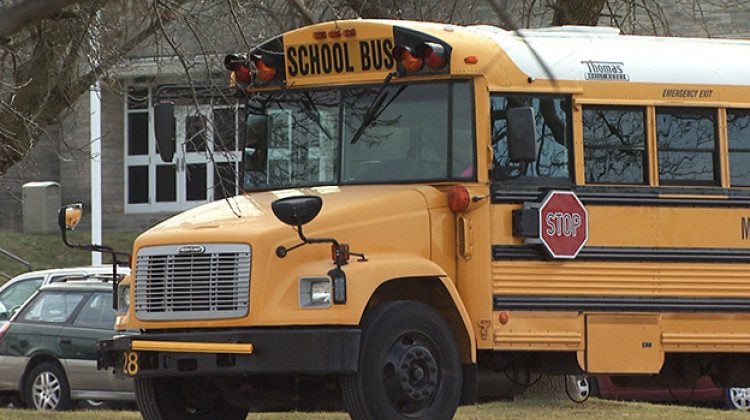Indiana has been a national leader for more than a decade in sending taxpayer dollars to help fund private school education through its school choice voucher program.

WFIU / WTIU
In last year’s state budget, Republicans expanded it further, making the program near-universal. Only families whose incomes are above $220,000 a year for a family of four aren’t eligible for those dollars.
Here’s what the state’s six Republican gubernatorial candidates say about the issue:
Chambers said the school choice system isn’t perfect yet and that he wants to address any existing inequalities.
But more broadly, the former state commerce secretary said Indiana needs to continue to push on improving literacy and math skills.
“If you have a literacy struggle starting in third grade, fourth grade, it’s going to follow you your entire life and it’s going to affect your ability to earn a living,” Chambers said. “Thirty-five percent of kids in sixth grade are struggling to pass their I-LEARN test with math scores. I mean, we’re 300,000 engineers behind China right now.”
Chambers said education needs to be more individualized, adapting to each child.
Crouch said while the state needs to continue to ensure parents have choices in education through the voucher program, she also acknowledged that 90 percent of Indiana children go to public schools.
Crouch said she wants to modernize education, in part by eliminating some of the silos that exist in administration.
“We have five agencies that have some kind of role in terms of educating our children or preparing them for the workforce. And what I would do is take those five agencies and consolidate them into one,” Crouch said. “Everybody is on the same page, working in tandem to make sure that our children are prepared for that next step upon graduation, whether it’s enlistment, employment, enrollment or apprenticeship.”
Crouch also emphasized the need to simplify the education system to ensure it’s teaching what she called the “four R’s:” reading, writing, arithmetic and reasoning.
Doden stressed that Indiana has a constitutional obligation, as well as a moral one, to provide an education system for all children. He said the voucher program creates competition that makes public schools better, though research suggests improvement is short-lived or that the competition actually makes public schools worse.
A big part of Doden’s campaign is detailed policy proposals, and in education he wants to improve teacher compensation.
“We have a teacher crisis, especially in our small communities,” Doden said. “We need to attract and retain talent with our teachers and the teacher investment program, which makes teacher’s income property tax free — it’s a $5,000 pay raise for the average teacher.”
Doden said the tax cut ensures teachers benefit directly.
The former head of the Indiana Economic Development Corporation also wants to use money the state will save after fully paying off a teacher pension fund to dramatically expand access to early childhood education.
Hill said that school choice, and the competition he said it creates, are fantastic. But he said the state must also focus on the high percentage of children that don’t have choices in their education.
Hill wants Indiana to “disentangle” itself from all federal school funding, which is hundreds of millions of dollars.
“Along with that money comes the rules, and that takes away local control,” Hill said. “So, we want to encourage our local schools to quit taking the federal dollars and buck up. We need to go back to basics. We need to make sure that our kids know how to read and know how to write.”
Hill argued much of the federal money is for bureaucratic things schools don’t need, such as programs to address bullying.
“We have to have a bullying program, placards on the wall that say no bullying zone, etc. When I was a kid, if you got bullied, you smacked a kid on the playground. You went to your mom and dad, or you went to your teacher and you dealt with it,” Hill said. “Now we have a cottage industry that’s set up to create victimization, counseling on all sorts of issues.”
Hill stressed that he wants parents to have greater responsibility in disciplining their children, rather than putting it all on schools and teachers.
Reitenour said Indiana’s voucher program works well and that she wouldn’t want to change it.
She also said the state cannot have a one-size-fits-all education system.
“Our desire [is] to see every child reach their potential,” Reitenour said. “And we’ve failed at that in the state of Indiana.”
Reitenour said school through fifth grade should be entirely about learning “the basics.” And at sixth grade, she wants to see private businesses come into the classroom to begin helping prepare students for life after school.
“We love the idea of adopt-a-highway, is kind of what we do in society right now, but we’d love to see adopt-a-classroom, where the private sector is coming in and they’re able to talk to our sixth graders about innovation and technology and AI and how that is specifically impacting their business,” Reitenour said.
Reitenour said, as governor, she would want to ensure every student has an apprenticeship in their senior year of high school.
U.S. Sen. Mike Braun (R-Ind.):
Braun served on the school board in his hometown of Jasper for a decade and said his local public schools are great.
“Not every place has that, and that is where you need choice and competition and options,” Braun said. “Public school system, where it’s working is great. And where it’s not, you don’t want to be stuck in a dead end there for the parents to have options for their kids.”
Braun said he will be “entrepreneurial” in ensuring parents have adequate options for their children’s education.
“We need to do better where we aren’t producing as many STEM degrees as what we should,” Braun said.
Braun said schools also need to teach life skills.










